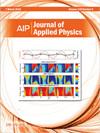基于针状雕刻声学拓扑绝缘体的可调立体路径设计方法与 Z 位错缺陷抗扰性
IF 2.7
3区 物理与天体物理
Q2 PHYSICS, APPLIED
引用次数: 0
摘要
受量子力学的启发,拓扑保护波工程领域引起了人们的极大兴趣。电子拓扑绝缘体的声学类似物为利用不受反向散射影响的非传统声学边缘模式操纵声音传播提供了新的机遇。关于二维声学拓扑绝缘体(ATIs)的设计已经发表了大量报告。然而,二维设计的声道比较简单,控制声波的能力有限。另一方面,三维声学拓扑绝缘体的设计相对复杂,难以制造,限制了其多功能性。基于二维 ATI 的设计理念,受三维针雕艺术的启发,我们设计了一种由横截面可变的纺锤形单元组成的有限尺寸可调结构,以实现灵活的路径转换。此外,与空洞和无序等二维结构缺陷不同,通过分析有限尺寸结构中的垂直位错缺陷,可以设计沿 Z 方向的局部声音传播,从而提供构建立体路径的概念。所设计的结构还具有两种功能:声学开关和延迟。这一想法为设计复杂的声音传播路径提供了另一种方法。本文章由计算机程序翻译,如有差异,请以英文原文为准。
Adjustable stereo path design method based on pin-sculpture acoustic topological insulator with Z-dislocation defect immunity
The field of topological protected wave engineering, inspired by quantum mechanics, has generated significant interest. Acoustic analogs of electronic topological insulators provide new opportunities for manipulating sound propagation with unconventional acoustic edge modes that are immune to backscattering. Numerous reports have been published on the design of two-dimensional acoustic topological insulators (ATIs). However, the sound path of a two-dimensional design is simple, and its ability to control sound waves is limited. On the other hand, the design of 3D ATIs is relatively complex, making it difficult to manufacture and limiting its versatility. Based on the design idea of the 2D ATIs, inspired by the art named 3D pin-sculpture, an adjustable structure of a finite size consisting of spindle-shaped units with a variable cross section is designed to realize flexible path transformation. Furthermore, unlike two-dimensional structural defects, such as cavities and disorder, the analysis of vertical dislocation defects in finite-sized structures allows for the design of local sound propagation along the z-direction, providing a concept for constructing a stereo path. The designed structure also serves two functions: acoustic switch and delay. This idea offers an alternative approach to designing complex sound transmission paths.
求助全文
通过发布文献求助,成功后即可免费获取论文全文。
去求助
来源期刊

Journal of Applied Physics
物理-物理:应用
CiteScore
5.40
自引率
9.40%
发文量
1534
审稿时长
2.3 months
期刊介绍:
The Journal of Applied Physics (JAP) is an influential international journal publishing significant new experimental and theoretical results of applied physics research.
Topics covered in JAP are diverse and reflect the most current applied physics research, including:
Dielectrics, ferroelectrics, and multiferroics-
Electrical discharges, plasmas, and plasma-surface interactions-
Emerging, interdisciplinary, and other fields of applied physics-
Magnetism, spintronics, and superconductivity-
Organic-Inorganic systems, including organic electronics-
Photonics, plasmonics, photovoltaics, lasers, optical materials, and phenomena-
Physics of devices and sensors-
Physics of materials, including electrical, thermal, mechanical and other properties-
Physics of matter under extreme conditions-
Physics of nanoscale and low-dimensional systems, including atomic and quantum phenomena-
Physics of semiconductors-
Soft matter, fluids, and biophysics-
Thin films, interfaces, and surfaces
 求助内容:
求助内容: 应助结果提醒方式:
应助结果提醒方式:


